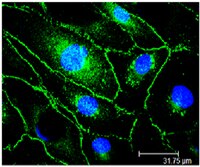MABT886 Sigma-AldrichAnti-VE-Cadherin Antibody, clone Vli37
This Anti-VE-Cadherin Antibody, clone Vli37 is validated for use in Western Blotting, Immunohistochemistry (Paraffin), Immunocytochemistry for the detection of VE-Cadherin.
More>> This Anti-VE-Cadherin Antibody, clone Vli37 is validated for use in Western Blotting, Immunohistochemistry (Paraffin), Immunocytochemistry for the detection of VE-Cadherin. Less<<Recommended Products
Overview
| Replacement Information |
|---|
Key Specifications Table
| Species Reactivity | Key Applications | Host | Format | Antibody Type |
|---|---|---|---|---|
| M, B | WB, IH(P), ICC | Rb | Culture Supernatant | Monoclonal Antibody |
| References |
|---|
| Product Information | |
|---|---|
| Format | Culture Supernatant |
| Presentation | Rabbit monoclonal IgG in supernatant with 0.05% sodium azide. |
| Quality Level | MQ100 |
| Physicochemical Information |
|---|
| Dimensions |
|---|
| Materials Information |
|---|
| Toxicological Information |
|---|
| Safety Information according to GHS |
|---|
| Safety Information |
|---|
| Packaging Information | |
|---|---|
| Material Size | 100 µL |
| Transport Information |
|---|
| Supplemental Information |
|---|
| Specifications |
|---|
| Global Trade Item Number | |
|---|---|
| Catalog Number | GTIN |
| MABT886 | 04055977331141 |
Documentation
Anti-VE-Cadherin Antibody, clone Vli37 SDS
| Title |
|---|
Anti-VE-Cadherin Antibody, clone Vli37 Certificates of Analysis
| Title | Lot Number |
|---|---|
| Anti-VE-Cadherin, clone Vli37 - 3419588 | 3419588 |
| Anti-VE-Cadherin, clone Vli37 - 3694731 | 3694731 |
| Anti-VE-Cadherin, clone Vli37 - 3896376 | 3896376 |
| Anti-VE-Cadherin, clone Vli37 - 3902097 | 3902097 |
| Anti-VE-Cadherin, clone Vli37 - 4048724 | 4048724 |
| Anti-VE-Cadherin, clone Vli37 - 4048724A | 4048724A |
| Anti-VE-Cadherin, clone Vli37 -Q2653601 | Q2653601 |
| Anti-VE-Cadherin, clone Vli37 Monoclonal Antibody | 2973056 |
| Anti-VE-Cadherin, clone Vli37 Monoclonal Antibody | 3100457 |











